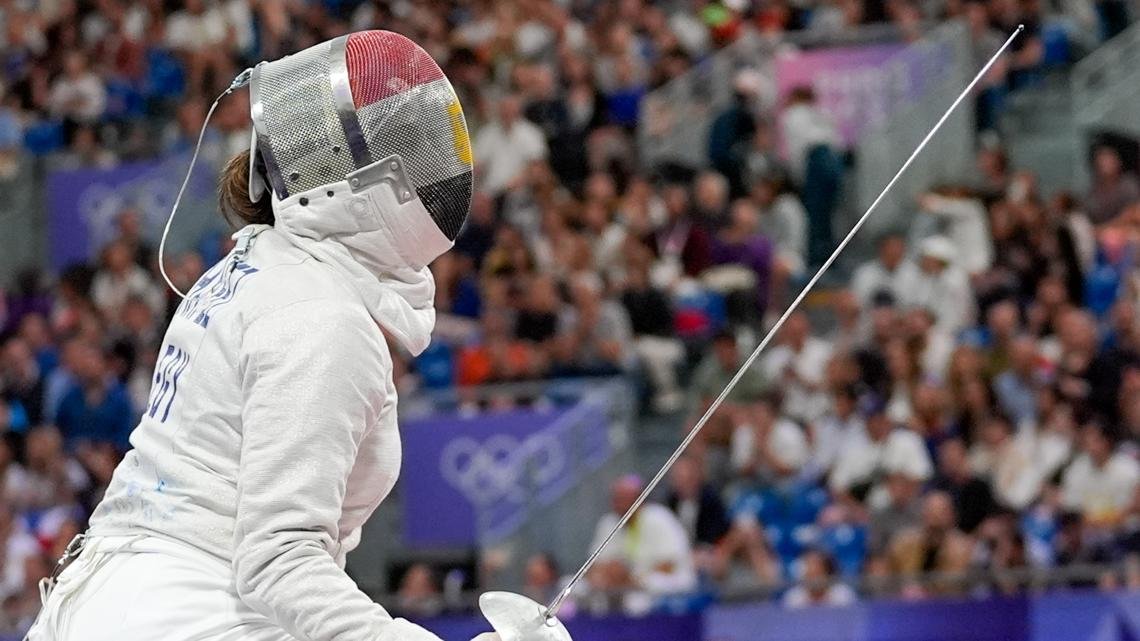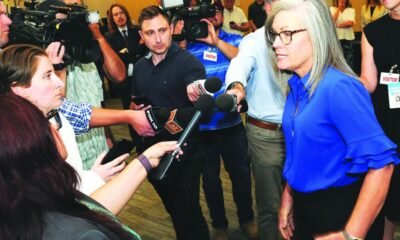Entertainment
Pregnant Olympians Shatter Barriers at Paris Games

Egyptian fencer Nada Hafez achieved her best Olympic result while competing at seven months pregnant, finishing 16th in Paris.
PARIS, France — Olympian Nada Hafez recently shared a remarkable revelation on Instagram following her fencing event. The Egyptian athlete was seven months pregnant during the competition, fencing not just for herself but also for her unborn child.
“What appears as two players on the podium were actually three!” Hafez wrote, accompanying an emotional photo from the match. “It was me, my competitor, and my yet-to-be-born baby.” This tournament marked Hafez’s highest Olympic ranking, placing 16th in her third Olympics.
In another instance of pregnancy and competition, Azerbaijani archer Yaylagul Ramazanova, six-and-a-half months pregnant, shared her experience on social media. She recounted feeling her baby kick just before shooting a perfect score.
While the phenomenon of pregnant Olympians is rare, it’s not unheard of. For instance, U.S. beach volleyball star Kerri Walsh Jennings won her third gold medal unknowingly five weeks pregnant during the London 2012 Games.
Dr. Kathryn Ackerman, a sports medicine physician, emphasized that modern attitudes and knowledge have shown women can maintain high levels of physical activity while pregnant. “If an athlete is in good condition and there are no complications, it’s safe to train and compete at a high level,” she said. However, caution is advised in riskier sports like ski racing.
In less physically demanding sports like archery or shooting, Ackerman noted, there is little reason for pregnant athletes not to compete. Emotional and family considerations, however, add another layer of complexity to these decisions, impacting female athletes in unique ways.
Serena Williams, a tennis superstar who won the Australian Open in 2017 while pregnant, stepped away from the sport to try for a second child, highlighting the difficult choices female athletes face. “If I were a guy, I wouldn’t be writing this because I’d be out there playing and winning while my wife was doing the physical labor of expanding our family,” Williams wrote in a Vogue essay.
At the Paris venue, spectators expressed mixed feelings. While some admired Hafez’s bravery, others questioned the safety of her decision. “It is courageous, even without making it to the podium,” remarked Pauline Dutertre, a former saber competitor.
Marilyne Barbey from Annecy added, “You can fall anywhere, at any time. In the end, it is her choice.” Ramazanova also garnered admiration for her performance, reaching the final 32 in her event.
Casey Kaufhold, an American archer who earned bronze in the mixed team category, praised her Azerbaijani colleague’s achievement. “It’s really cool to see more expecting mothers competing in the Olympic Games,” she said, expressing hope that it would inspire more mothers to pursue their athletic dreams. “I think it’s awesome for this archer that one day, she can tell her kid, ‘Hey, I went to the Olympic Games and you were there, too.’”













![Maricopa Planning and Zoning Commission Chair James Singleton sits at the dais with Commissioners Ted Yocum and Robert Klob during a meeting June 9, 2025. [Monica D. Spencer]](https://arizonanews.org/wp-content/uploads/2025/06/Zoning-Board-Divides-Opinion-and-Delays-Decisions-on-Eastside-Housing-80x80.jpg)




